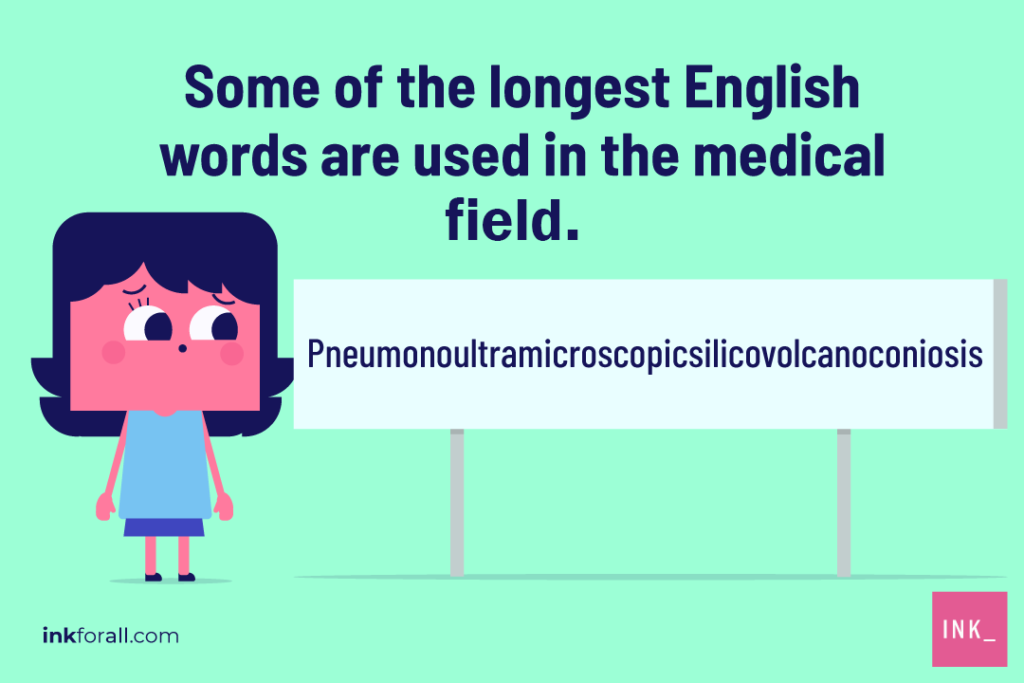What Is the Longest Word in the English Language
We've all been there: trying to pronounce chemical names on the back of a shampoo bottle. No surprise one of the longest words in English is the chemical name for the human titin protein.
One of the longest English words has over 180,000 letters. Spelling it would take 57 pages, so we won't drag it out here. With that said, there are plenty of other big words in the English language. So, we've listed some of them using much smaller words in this article.
🤩 Flawless spelling & grammar are just the beginning. Eliminate errors, get topic ideas, increase productivity, and outrank your competition with the #1 smartest content editor — INK. 🤩

Get the Best Writing Tool For Free
First AI web content optimization platform just for writers
GET INK
Main Longest Words in English Takeaways:
- The average English word has 4.5 letters.
- Many of the longest words in English are scientific or medical terms.
- Pneumonoultramicroscopicsilicovolcanoconiosis has 45 letters.
- Pseudopseudohypoparathyroidism has 30 letters.
- Prefixes and compounds can increase word length.
In this article, we've compiled some of the longest words for anyone who appreciates the English language. So, prepare yourself because your vocabulary is about to get much bigger—pun intended.

How Long is the Average Word?
Before we discuss big words, let's start with some basics. The average English word contains 4.5 letters. The longest words in English dictionaries have significantly more letters than that.
Nearly 60% of English words have at least one 'e' in them. 'T' comes in second, as it appears in 47.3% of words. Meanwhile, 'Z' finds a home in just 0.3% of words, with 'q' not far behind at 0.5%.
Why are Some Words So Long?
We often see a word with lots of letters and wonder what happened. Why would anyone create such a long word? Technically, some word formation rules result in big words. For instance, Long words often contain multiple prefixes or compound terms.
"Great" is a prefix that can significantly alter the length of a word. Genetics aside, you can use "great" as many times as you want for family titles. Make sure to use hyphens in between the "great" prefixes, and not commas.
Compound words can also get long. This is especially true when writers hyphenate adjectives. These words can easily become three- or four-word compounds.

Three-Word Hyphenated Compounds
- Do-it-yourself
- Salt-and-pepper
- Remote-robot-assisted
- New-and-improved
Four-Word Hyphenated Compounds
- Run-of-the-mill
- State-of-the-art
- Too-big-to-fail
- Chocolate-chip-milkshake-loving
You may have seen even longer compounds than these. For example, perhaps you viewed a blink-and-you-missed-it theatrical run.
What's the Longest English Word?
The longest word in the English language has 189,819 letters. We'd love to share it, but it's 57 pages long, which means a lot of scrolling! So, the word we're talking about here refers to a chemical compound called titin. For the uninitiated, titin is a human protein found in our vertebral muscle.
Titin's official term is 189,819 words because it follows traditional protein-naming guidelines. Proteins' names are typically derived from their contributing chemicals. Titin has a lengthy chemical list.

Fun fact: It would take 3.5 hours to say the official name for titin out loud.
Some lexicographers consider titin a verbal formula rather than an official word. Lexicographers are the language experts who help create dictionaries. Traditional dictionaries don't have room for lengthy words such as the scientific term for titin.
What are Some of the Longest Words in English?
Many big words are scientific or medical terms. Normally, scientists combine several ingredients and traits to form these scientific terms. Meanwhile, medical terms often contain prefixes and suffixes.
Most of us don't have hours to pronounce the scientific term for titin. However, you can impress your friends with these long words:
1. lopadotemachoselachogaleokranioleipsanodrimhypotrimmatosilphioparaomelitokatakechymenokichlepikossyphophattoperisteralektryonoptekephalliokigklopeleiolagoiosiraiobaphetraganopterygon (182 letters) – a fictional meal referenced in Assemblywomen, a comedy by Aristophanes.
2. pneumonoultramicroscopicsilicovolcanoconiosis (45 letters) – a synonym for silicosis. Silicosis is a lung disease caused by inhaling silica. It's also the longest word that you'll find in most well-known dictionaries.
3. supercalifragilisticexpialidocious (34 letters) – a nonsense word featured in Mary Poppins. Admit it: You sang this word rather than read it.
4. pseudopseudohypoparathyroidism (30 letters) – a genetic medical condition similar to pseudohypoparathyroidism.

5. floccinaucinihilipilification (29 letters) – the act of finding something worthless or without value. Finally, a nontechnical word on our list!
6. antidisestablishmentarianism (28 letters) – a political stance that opposes disestablishment. While many people assume antidisestablishmentarianism is the longest word in the English language, it's not. In fact, it has 12 syllables only.
7. honorificabilitudinitatibus (27 letters) – with honorableness. This is an interesting word because it alternates consonants and vowels.
Why are Scientific Words So Long?
Maybe you have noticed that many of the longest words to date are scientific words. Why is that so? It's because the scientific naming convention or binomial nomenclature followed by the scientific community is derived from Latin. Latin words tend to have more vowels and, therefore, more letters. This naming convention is standardized. Meaning, every creature or organism will only have one scientific name, regardless of where they are in the world. Here are some examples:
1. Parastratiosphecomyia stratiosphecomyioides (42 letters) — a species of soldier fly native to Thailand.
2. Griseotyrannus aurantioatrocristatus (36 letters) — a species of bird. It is native to South-Central and South-Eastern Amazonia. It is known as the crown slaty flycatcher.
3. Anaerobiospirillum succiniciproducens (37 letters) — a genus of spiral-shaped bacteria.
4. Gammaracanthuskytodermogammarus loricatobaicalensis (51 letters) — the longest proposed name for an organism — a tiny amphipod from Lake Baikal, the world's deepest lake, in Russia.
In Short…
Ridiculously long words can make for interesting trivia, but, let's face it, few will benefit from adding these monstrosities to their vocabulary. But if you're looking for a lengthy word that could net you a world record, try oxyphenbutazone. It's believed to be the highest-scoring word that can be played in a game of Scrabble (1,458 points on an outside edge).
Quick Longest Words in English Grammar Quiz
Longest Words in English Question #1
Correct! Oops! That's incorrect.
The answer is TRUE. Nearly 60 percent of English words have at least one "e" in them.
Longest Words in English Question #2
Correct! Oops! That's incorrect.
The answer is B. An average English word has 4.5 letters.
Longest Words in English Question #3
Correct! Oops! That's incorrect.
The answer is False. "Z" is the least common letter, present in 0.3 percent of English words. On the other hand, "q" is present in 0.5 percent of English words.
Longest Words in English Question #4
Correct! Oops! That's incorrect.
The answer is B. This plural form of incomprehensibility describes things or events that are difficult to understand.
Read More: Hyphen vs. Dash: Size Matters in Punctuation
What Is the Longest Word in the English Language
Source: https://blog.inkforall.com/longest-words-in-english